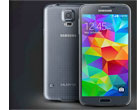« Android parlor trick | Main | Getac's latest rugged convertible replaces the V8 with a turbo-4 »
February 25, 2014
Samsung Galaxy S5 -- raising the bar
On February 24, 2014, Samsung showed their new flagship smartphone, the Galaxy S5. It's relevant because it'll sell by the many millions, and it'll be the primary opponent to Apple's current 5s and whatever Apple comes up with next.  But the Galaxy S5 is also relevant because the technology it includes and provides will become the new norm. It'll be what people expect in a handheld. And that affects the rugged industrial and vertical markets, because what the Galaxy S5 (and soon many other consumer smartphones) offers is the benchmark, and people won't accept considerably less on the job.
But the Galaxy S5 is also relevant because the technology it includes and provides will become the new norm. It'll be what people expect in a handheld. And that affects the rugged industrial and vertical markets, because what the Galaxy S5 (and soon many other consumer smartphones) offers is the benchmark, and people won't accept considerably less on the job.
The Galaxy S5 is essentially a little tablet with phone functionality built in. It measures 5.6 x 2.9 x 0.32 inches and weighs five ounces. That's a lot larger than those tiny phones of a few years ago when the measure of phone sophistication and progress was how small a phone could be made. The S5 is really not pocketable anymore, but because it's so thin it still weighs less than half of what some of the original PDAs weighed.
The Galaxy S5 screen measures 5.1 inches diagonally, and offers full 1920 x 1080 pixel resolution. That's the same as the current generation of giant flatscreen TVs, making the Galaxy's display razor-sharp, and essentially making a mockery of any claim to "high definition" that a current TV may have. And the screen uses OLED technology, which means no backlight and a perfect viewing angle.
There are, of course, two cameras. The frontal one has 2mp resolution, which in theory means that vidcam conversations can go on in full 1080p video. The other one has 16mp, not as almost absurdly extreme (42mp) as the one Nokia offers in its flagship, but much higher than Apple, and the same you'd expect from a good dedicated camera. And it can even record in 4k video. If it's in full 30 frames per second, that's something even the vaunted GoPro Black Edition can't, and it'll mean that the vast majority of hyper-sharp 4k video may come from smartphones, and not from some sort of disc player (no 4k standard exists yet), not from streaming video (most internet connections still can't handle that), and not from dedicated cameras (there are hardly any for now).
Memory, no surprises there. But I should mention once again that the 16 or 32GB of storage built into smartphones such as the new Galaxy S5 more than likely contributed to the impending demise of lower-end dedicated digital cameras which, for some unfathomable reason, still only have 32MB (megabyte, not gigabyte) on board, one thousand times less than a smartphone.
Communication? The fastest available WiFi (802.11ac) and the latest rev of Bluetooth (4.0) and also NFC, near field communication, sort of a version of RFID. Then there's a fingerprint scanner, and—also new—a pulse scanner than can include heart beat into all sorts of apps and systems. I've long believed that sensors are a field of advance and new capabilities, providing handhelds ever more information about their environment, and thus making them ever more useful.
And it's all powered by a 2.5GHz quad-core Snapdragon 800 processor that makes older processor technology look like cast iron flathead six designs from the 40s compared to a computer-controlled modern turbo with variable valve timing.
Setting the bar even higher, this new Galaxy phone carries IP67 sealing, which means it's totally dust-proof, and also waterproof to the extent where it can survive full immersion into water down to about three feet. IP67 has long been the holy grail of rugged computer sealing, and now Samsung offers it in a consumer smartphone that's an eighth of an inch thick.
I think it's fair to say that the bar has been raised. Dedicated industrial and professional tools will always do this thing better or that, have better dedicated components such as scanners, and they can, overall, be much tougher than any eighth-inch smartphone can ever be. But this level of technology so freely available to millions is simply certain to have an impact on expectations.
Posted by conradb212 at February 25, 2014 3:48 PM
















